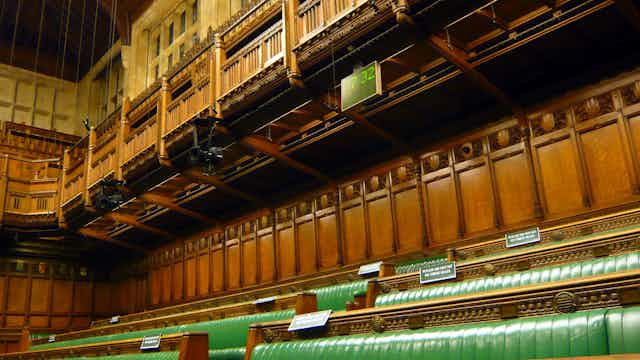A recent spate of resignations by British parliamentarians has triggered some extremely tense by-elections, caused turmoil within the main political parties and left many constituents feeling unrepresented, or at worst abandoned. But these resignations should also have us thinking about the demands we place on our democratic representatives.
In fact, 2016 saw the most MPs resign in 39 years. A total of six took the “Chiltern Hundreds” – the 18th century workaround of an earlier act prohibiting resignations of sitting members. This was created as a response to members resigning their seats due to poor pay, and the regular long travel they endured. Being an MP back then was a burden more than a privilege. Now, centuries later, it seems there could be a revival of the unwilling MP.
MPs have a long history of abandoning their seats for employment elsewhere but the frequency with which it is happening now is something new. A total of 54 MPs have resigned since 1979 – but 53.7% of them have jumped ship within the past ten years.
Their departures are of course driven by a variety of reasons, from party political differences, scandals or offers of new jobs. Of the 54 MPs that have resigned, 31 have left to take a role somewhere else and 16 have taken jobs outside the British political system, such as in the private sector. Another 12 gave up their national seats for local ones – as police and crime commissioners, mayors, or to serve on local assemblies.
The recent cases of Labour MPs Tristram Hunt and Jamie Reed have caused debate in particular, though. Hunt left the House of Commons to become the director of London’s Victoria and Albert Museum after serving as an MP for seven years. Reed, who has triggered a knife-edge by-election by quitting his Copeland constituency, even went as far to say he could better serve his community in his new job at the local Sellafield power station than as its MP.
Fighting these two by-elections will be a daunting task for Labour. Copeland and Stoke-on-Trent are traditional safe seats for the party. However, in the 2015 general election Copeland returned with a reduced majority. Alongside this, both seats voted Leave in the EU referendum, while their local MPs backed Remain. There is also the perceived dislike of party leader Jeremy Corbyn, who has a net leadership rating of -27%.
All this leaves these seats in a particularly vulnerable state – with UKIP leader Paul Nuttall a strong contender for Hunt’s former seat, and the Conservative campaign managers fighting full force in Reed’s seat, Copeland. A loss for Labour in either of these seats would be disastrous on top of having their MPs resign.
For MPs, the grass might be greener on the other side. After all, they have incredibly stressful jobs. One report notes how new MPs expect 60 hour weeks, but often work 67. They have little to no work/life balance, and spend a significant amount of time travelling between Westminster and their constituency.

What’s more, being a political representative is truly a thankless task. For all their hard work, MPs are ranked low in overall satisfaction polls. Their private lives are often thrown out into the open and they face unprecedented levels of harassment and abuse. Recent research shows 81% of MPs have reported they have been harassed in some way, with many more being subjected to physical violence to themselves or their property. The murder of Labour MP Jo Cox in 2016 highlighted the fact that becoming an MP is to potentially put yourself in danger.
The atmosphere in which MPs reside is truly the definition of a toxic work environment. It’s therefore no wonder that you can expect politicians to resign. Low job satisfaction is the leading cause of companies losing staff, why wouldn’t it be the same for the House of Commons?
But the places MPs choose to move to may suggest another motivation for resigning. They take other representative roles, higher up roles in the EU, directorships of private institutions – two MPs have even quit for media roles. These are all jobs which have a large degree of authority or influence. Perhaps no coincidence that out of the 31 who have quit for another role, 22 of these have been MPs from the opposition benches. They may find they can have a greater influence or have more impact outside the House of Commons.
We can expect more Labour resignations under the leadership of Corbyn. The failed coup of 2016, alongside shadow minister resignations, suggest as much. Even loyal Corbyn supporter Clive Lewis resigned over Corbyn’s three line whip on the recent EU vote. Some Labour MPs now clearly feel that the only influence they have is in the form of a resignation letter. Falling poll numbers also mean Labour MPs are reflecting on their future electoral liability under Corbyn. If they resign, they may simply be jumping before they are pushed at the next election.
There is a big cost when an MP resigns. For a start, there is the average £239,529 price tag for running a by-election, plus the money parties need to spend on campaigning. Then there is the political capital lost by the party when one of their MPs resigns. The Commons also loses the wealth of experience the MP may have held. After all, people who aren’t capable are not offered roles as EU commissioners or directorships of major organisations.
So it may be worth thinking about the toxic working conditions representatives of the British people must face. It may even be time for a deeper investigation into the state of British democracy, and why MPs who sit in supposedly one of the 650 most important seats in the United Kingdom feel that they will be better suited, and have more influence, outside Westminster.

